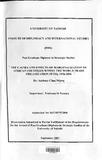| dc.description.abstract | This dissertation examines the marginalization of African countries within the World
Trade Organization (WTO). The major objectives of the study is to find out if Africa
benefits from the WTO agreements and/or rounds; to establish whether Africa has an
enhanced share in the World trade; to establish whether the WTO has African
interests in World trade issues; and to identify key issues of concern to African
Countries in WTO.
The World Trade Organization (WTO), was legally created on 1 January 1995 with a
membership of 128 countries. Its emergence was a partly response to the changing
imperatives of the international trading system in the 1990s. It was established from
the General Agreement on Tariffs and Trade (GATT). The (jA TT was considered a
poor substitute to the aborted International Trade Organization (lTO). GATT was
formed from parts of the International Trade Organization, a proposed specialized
agency of the United Nations. GATT was established with minimal institutional
arrangements, in order to expedite its approval; it was supposed to be temporary, and
its functions were to be assumed by the ITO. It is, however worth mentioning that the
idea behind the formation of the ITO was, because the industrial stated that prepared
the Havana Charter needed approval of the participating less developed countries
(LDCs), the charter incorporated provisions that took into account some of the
provisions that tool into account some of the LDCs special needs. Moreover the
international trade organization (ITO) opened possibility for participation in the
management of international trade. The Havana Charter and the ITO, never came into
IV
effect. The notion of the "less developed countries", negative connotations in itself to
some scholars; those who live in a European or North American city cannot easily
envision the conditions that are a way of life for hundred of millions of people in
Africa, Asia and Latin America. Only a provisional visit can transform academic
descriptions into living images of deprivation, squalor, and helplessness. The term
less-developed countries (LDCs), used in current literature resembles a decent
garment thrown over the emaciated shoulders and the swollen belly of a sickly,
malnourished child. It may conceal some of the ugliness but it does not give an
accurate image of real ity.
The creation of the WTO was also a function of the elaborate negotiation process that
resulted in what may be described as a "Grand Bargain". The creation of a
multilateral trade organization was not on the agenda when the Uruguay Round was
launched. Due to the dissatisfactions that were brewing around GATT the WTO came
into being. The first seven rounds of negotiations were launched in Geneva (1974); in
Annecy, France (1949); in Torquay, England (1950-1951); and in Geneva (1955-
1956, 1961-1962 [the Dillon Round], 1964-1967 [the Kennedy Round], and1973-
1979 [the Tokyo Round]). The eighth round, launched in Punta del Este, Uruguay
(1986-1993 [the Uruguay Round]), was the one from which the WTO was born.
The World Trade Organization (WTO), was formed in 1995. Its predecessor
organizations are GATT and ITO. Ever since the inception of the World Trade
Organization, African member countries have not fully benefited from the mandate
governing it. The WTO has a multiplicity of roles which may have not been
beneficial to African member-states. The areas of interest are the number of
v
objectives which are questionable as to whether they are a practical backdrop to the
African context. These objectives are; improved standards of living, full employment,
and an enhanced share of developing countries in the world trade. The area of utmost
concern is, however, whether African countries have benefited from the so-called
reciprocal and mutual advantageous arrangements directed at the substantial reduction
if tariffs and other barriers to trade and to the elimination of discriminatory treatment
in international liberalization of trade.
Although the core objective of the WTO is confined to trade liberalization, African
countries seem to have found themselves not fully benefiting from this arrangement.
'The consequence of this is that Africa has become marginal in Europe's trade and,
more tellingly, in its attention. Trade liberalization within the World Trade
Organization (WTO) has also sidelined Africa. The notion" of trade liberalization,
among others, was to adhere to the lowering of tariffs by all member states regardless
of their stature. The African situation is that, does it really have such products that it
is best at producing? This is related to the concept comparative advantage. Even if it
might be having such products are they quality enough to fairly compete in the world
market?
African countries have to some extent not been able to fully participate in world trade
since the developed countries have adopted the protectionist policies on their
products. This has caused African countries to fail in participating in world trade.
VI
The other area of concern is that African countries have found themselves in a
situation of marginalization or putting African countries in the periphery. It is worth
noting that, 'the key feature of the international economy is the decision of the world
into core, semi-periphery and periphery areas. Within the semi-periphery and the
periphery there exist cores which are tied into the capitalist world economy, whilst
within even the core are there are peripheral economic areas. In all of this that matter
is the dominance of the power not of states but of international capitalism, and it is
these factors that ultimately determine the main political patterns in world politics.
This environment has compelled Africa to fail in shaping the WTO to her advantage.
African countries, have therefore, become rule-takers rather than agenda setters. It is
worth noting that some officials from African member states have failed to influence
key decision making meetings since a good many of them lack bargaining skills . | en |

